Wild and harbour swimming safety warning issued by authorities
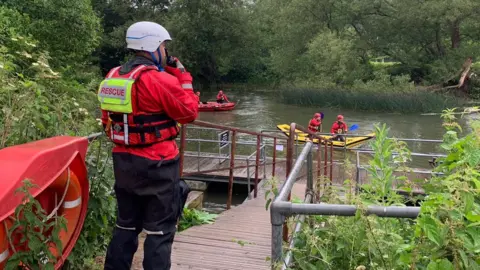 BBC
BBCWater spots across the west have seen high numbers of visitors in search of a place to cool off following recent hot weather. But now people are being warned about the hidden dangers of wild swimming after "a number of incidents" on Bristol's harbourside and with concerns over river pollution levels and the dangers of swimming in reservoirs. But wild swimmers say as long as it is done safely, braving the water can have huge health benefits.
'Risk of serious injury'
The Bristol Water Safety Partnership say people "face serous risk of injury" getting into the city's harbour, with dangers both on the surface and beneath.
The waterway through the centre of Bristol is a working harbour with vessels coming and going as well as a number of other water activities taking place.
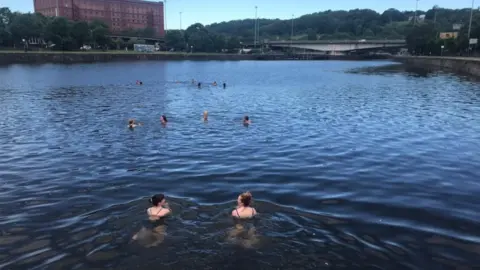
The warning comes two weeks after a group of wild swimmers entered the Cumberland Basin in protest against the ban on swimming.
Swimming is banned unless consent is given by the city's Harbour Master.
The Bristol Water Safety Partnership said people need to be aware that swimming in the harbour is "a very different experience to doing so in a river or a lake".
Even in summer water remains cold enough to induce cold water shock, it said, which can cause "even the strongest swimmers to gasp for breath, inhale water, cause panic and can lead to drowning".
It also warned of variable water quality, spring tides and hidden dangers beneath the water, from rocks to rubbish or other hazardous materials.
Avon Fire and Rescue Service group manager, Harry Awramenko, said: "In the past two years we've responded to over 70 water related incidents in Bristol alone, and, sadly, 25 of those resulted in serious injury or death."
Jon James, head of service natural and marine environment at Bristol City Council said while the council is exploring the potential of introducing safe, managed and segregated swimming to the harbourside, "this is not in place right now".

What do wild swimmers say?
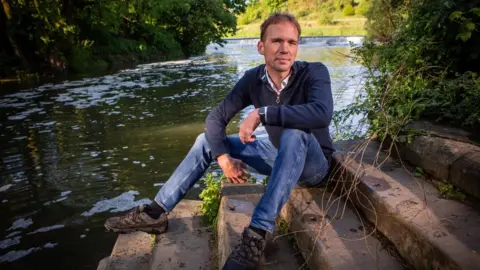 Andre Regini
Andre ReginiJohnny Palmer, owner of popular wild swimming spot Warleigh Weir near Bath and campaigner for swimming in Bristol's harbour, accepts there are risks but says they can "reduce these risks significantly, if not entirely".
"If you just jump in the harbour without knowing what you are doing, it is very likely something very bad is going to happen, but if you understand the risks and build your skills there are ways to do things in a way that it reduces the risk so much that it becomes a safe pass time," he said.
"Prohibition like we have right now doesn't work, we need education and cultural shift."
Clevedon Marine Lake trustee and outdoor swimming coach, Laura Nesbitt, from Cheddar in Somerset, says people should not be put off from outdoor swimming - as long as it is done safely.
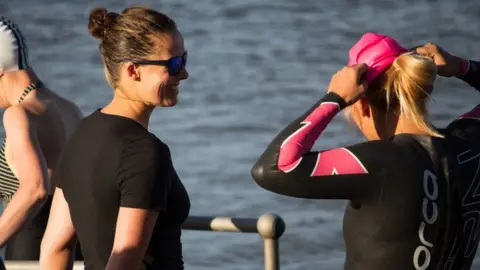 Danny Albone
Danny AlboneShe says that giving people access to open water is beneficial both for their physical and mental health.
"Spending time outdoors has a great effect on your health, but also getting into water is like having a big hug - it has got the same chemical release," she said.
"The pandemic has sped up awareness, but the authorities need to be providing safety in the form of signage and QR codes with links to websites on the dos and don't."
She said that before entering the water people should consider:
- Water quality
- Water temperature
- The geography of where you are swimming - can you get in and out of the water safely?
- Who are you with? Have you notified anyone you are going to enter the water?

'People have got sick'
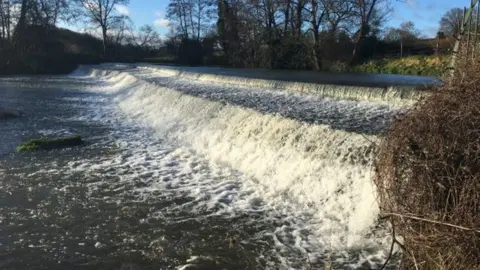 Anthony Battersby
Anthony BattersbyIn Somerset, a parish councillor has warned people against swimming in the River Frome where he says pollution levels are causing concern.
Anthony Battersby, the acting clerk of Tellisford Parish Council, says that last weekend they had 400-500 people swimming near Tellisford Weir.
But he says raw sewage is being discharged untreated into the river and that swimming there is "asking for trouble".
"Quiet often we hear of people getting sick and it is all to do with the fact that most of the sewers are combined, so you get surface water and sewage water, and when you get a big storm, they overflow," he said.
Mr Battersby said that upstream of Tellisford there are 30 sewage outfalls and that the Environment Agency has recorded 49 different chemicals or minerals in samples from the Frome, many of which are carcinogenic or poisonous, including mercury, lead and arsenic.
However, the Environment Agency says that the substances detected in the waters of the Frome were not at a level "considered to be harmful to human health".
The Rivers Trust, which works to protect and enhance the river environment, for people and wildlife, advises that "a good rule of thumb" is to never swim in the days following heavy rain and to cover any cuts with waterproof plasters and never swim in stagnant water.
'Beware hidden hazards'
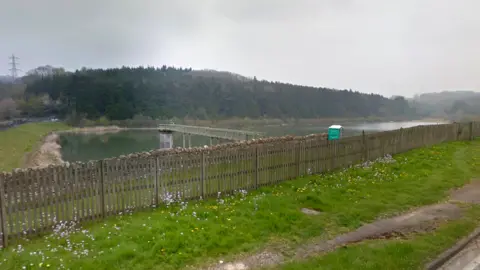 Google
GoogleMeanwhile, others are being reminded of the dangers of swimming in reservoirs, where underwater pipes can have enough suction to trap a swimmer above them.
It comes after reports of children taking a dip at Dowdeswell Reservoir, near Cheltenham.
Anthony Perry, operations manager at the Environment Agency said: "The reservoir itself has got underwater pipes and currents that take water through a large dam into the River Chelt. When you look at it you would think, what a lovely area, yet actually it is not safe."
Severn Trent Water has added its voice to the pleas for people not to swim in reservoirs.
Dan Taberner, visitor experience manager for the company, said: "On the surface they [reservoirs] look calm and steady but, underneath, the water is very deep with incredibly strong currents that even the most experienced swimmer would struggle with."
Gloucestershire Police said that as the hot weather continues, officers from the Cotswolds will be patrolling around reservoirs to warn of the risks involved.

Follow BBC West on Facebook, Twitter and Instagram. Send your story ideas to: [email protected]
